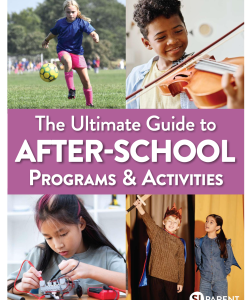
I won’t say it’s every parent’s worst nightmare, but it’s damn near close. And in this high-tech age of digital information sharing, wherein almost anyone can dig up almost anything on the internet in seconds, the risk of your child’s exposure to inappropriate material is depressingly high.
I admit I was more trusting with my kids’ devices than I should have been. I held an ignorant “not my kid” attitude when it came to the possibility of anyone discovering anything sexual in nature. Honestly, my 11-year-old son still thinks boobs are weird and my daughter is only eight. I really thought I had more time to worry about this.
That is, until the day I switched on my daughter’s iPad and was shocked to see a tab open to Pornhub, a popular free pornography website. That can’t be right, I had thought to myself. Surely she stumbled onto that site somehow by mistake. But my denial evaporated with a quick scan of her search history, where I found dozens more x-rated websites and clips.
My heart was pounding in my chest as I scrolled through the list of lewd video titles. Most of the sites were animated. Some were even dirty versions of familiar video game characters — apparently sick people specifically target children with sexually explicit cartoons. I was shaken, horrified.
She’s only eight. How on earth could I let this happen? Surely she didn’t even have a clue what she was looking at?
My knee-jerk reaction was to punish, punish, punish. Punish for an eternity, if need be. Let her watch as I toss every electronic device we owned directly into the trash, and maybe even flag down a garbage truck so she could listen as they all crunched inside the hopper blade.
As angry as I was, and physically ill, I knew deep down that punishing her was not the way to go. It would only be humiliating and could lead to damaging long-term effects. I’m no psychologist, but I knew that much.
I just wasn’t sure how to handle any of it. I needed her to understand that she wasn’t ready to see the things she saw, without shaming her for essentially being curious. I wanted to do some research to see how other parents handled it, but I hesitated to search the internet. I feared the results Google might spit out as a result of typing both the words “child” and “porn” into the search bar. Thankfully, with a carefully worded query, I found some helpful advice for dealing with my delicate situation.
Be Prepared
As it turns out, young children being exposed to pornography is more common than I thought. Parents with kids even younger than my daughter had faced the same issue I was dealing with. All of my research seemed to emphasize the following key points:
- Never shame or punish.
- Discuss it immediately. Ask questions and allow the child to ask as many questions as she needs to.
- Make sure your child is aware that pornography is intended for adults and is often a very unrealistic portrayal of real-life sexual intercourse.
The Talk
We sat down that night not sure what to expect. I was armed with my day’s research, but there was no telling just how it would go down in real life. What if she denied it all? What if she got upset? What if I lost my temper? There were so many ways it could go wrong.
I began by calmly explaining what I had seen on her iPad, and asking how she learned to look up videos like that. She was very quiet for a moment and her voice dropped down to barely a whisper. She replied that a friend (only seven years old!) had shown her how to type “p-o-r-n” into a search bar during a play date. I knew she was being honest because I had noticed that play date was the same day the videos first appeared in her browsing history. I thanked her for her honesty.
Next I asked if she understood what she had seen, and she replied that she didn’t but that she still found it “interesting.”
She was being sincere, and I saw exactly where she was coming from. We live in a society where sex is a very taboo subject, completely off-limits in even most adult conversations. Choosing to be open with your child about sex is each parent’s individual right and choice, but as a society we have created a stigma around the topic that makes it understandably mysterious enough to pique the interest of any curious child.
I couldn’t help but wonder… If I’d been more open about it in the past, would she have come to me right away? Would she have asked about the videos her friend had shown her that day instead of doing her own “research?”
Putting aside the “what ifs” plaguing my brain, I gave her the floor. I asked if she had any questions about what she’d seen, about her body, about anyone’s body. She asked why they were doing “that stuff” in the videos. She asked if that was how babies were made. She asked if they loved each other. I continued to encourage her questions, and her dad and I answered as openly and honestly as we could.
In the end, she promised she wouldn’t look at anymore inappropriate videos. We also stressed that the things she’d observed in those clips didn’t accurately represent what happens when two people who care about each other are together—that just like in movies and on TV shows, things are often exaggerated for effect and shouldn’t be seen as realistic.
Prevention
Did I handle it well? Time will tell. But I did my best and I think she now has a clearer understanding of what she’d seen and why she wasn’t ready for it.
Although she promised she wouldn’t watch those videos ever again, we are still taking measures to ensure she won’t have access to them.
Setting the privacy controls on your child’s electronic devices is a must. You can easily choose which websites they can and can’t access. Instead of YouTube, try YouTube Kids. Instead of Google, you can let them use Kiddle.co (not .com), a search engine safe for children. Be sure to bookmark CommonSenseMedia.org, which offers age recommendations for thousands of books, TV shows, movies and more.
Consider downloading parental control apps that allow you to monitor your child’s app usage and web browsing, as well as block pornography and inappropriate content. Some also allow you to check all SMS and text messages, photos, and even set restrictions on device use altogether.
I plan to always monitor my daughter’s internet use in the future, as well as continue having conversations together regarding anything at all she is curious about. Keeping the dialogue open from early on might allow for a more trusting relationship as she gets older.
It’s easy to take a “not my kid” stance when it comes to pornography, but as parents we have to remain vigilant and keep the lines of communication with our children as open and honest as possible.
By Jeannine Benedicks-Cintron, a Staten Island mom of two who misses when the toughest talk she had with her kids involved running out of fruit snacks.

